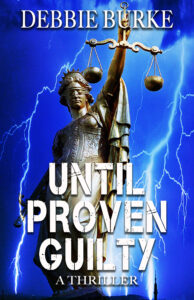by James Scott Bell
@jamesscottbell
I had another post I was working on, but life got in the way. So I thought I’d rerun a column on discoverability. It seems apt in this age of AI. Has anything changed? Where we go:
Discoverability is becoming as rare as the blue-footed booby.
According to Bowker, the outfit that registers ISBN numbers, over a million self-published books were issued ISBNs last year.
That’s a one with six zeros after it.
And understand, this does not include traditionally-published books, nor all the ebook-only titles without ISBNs.
Which means there’s a whole lotta books out there, and more added every year. (Most of which are bad. See Sturgeon’s Law.)
Industry observer Mike Shatzkin added this:
I had reason to learn recently that Ingram has 16 million individual titles loaded in their Lightning Source database ready to be delivered as a bound book to you within 24 hours, if not sooner. So every book coming into the world today is competing against 16 million other books that you might buy.
That number — the number of individual book titles available to any consumer, bookstore, or library — has exploded in my working lifetime. As recently as 25 years ago, the potential titles available — in print and on a warehouse shelf ready to be ordered, or even to be backordered until a next printing — was numbered in the hundreds of thousands. So it has grown by 20 or 30 or 40 times. That’s between 2000 percent and 4000 percent in the last quarter century.
Of discoverability, agent Rachelle Gardner recently observed:
How can any single book stand out in that large of a field? It’s very difficult. The problem is known as discoverability and it means the odds are stacked against us when we want to bring readers’ attention to our books.
This is why the publisher needs your help—it’s important to find your audience, that specific group of people who will like your book. They need you engaging with your audience, connecting with them, doing your part to make them aware of you.
Even with all this work, it’s still hard to make your book discoverable. It’s not anyone’s fault. Publishers are not conspiring to make life difficult for you. They’re not being unreasonable by requiring authors to participate in marketing. It’s simply the situation we find ourselves in—there are too many books, so we all have to work so much harder to each one stand out to its unique audience.
One line that jumped out at me is: the publisher needs your help. It used to be the other way around. A writer needed a traditional publisher to get into bookstores. If there were some marketing dollars in the budget, the publisher might arrange to have the book placed on the New Release table at the front of the store.
But now, with bookstore space shrinking, and marketing push going almost exclusively to the A list, authors writing inside the walls of the Forbidden City are expected to do audience building themselves (which has some authors wondering why the publishing houses still take the same royalty split as when they did all the heavy lifting. But I digress).
So how do you build an audience these days? The old-fashioned way. You earn it. (Hat tip to John Houseman).
Book after book. And more than one or two titles. You don’t hit a stride until you have several books out there to go with a steady pace of future production.
Another agent, Steve Laube, also reflected on the Bowker publishing numbers, and offered this advice:
- Write the very best book you can.
- Build an audience who will support your work (i.e. platform).
- Decide whether to self-publish (but only do it the right way) or go the traditional route (get an agent).
- Figure out how to launch a book.
The fundamentals don’t change, do they? That’s why they’re called fundamentals. I’d modify the list a bit this way:
- Write the very best books (plural) you can, at least one per year.
- Keep learning and growing in the craft.
- Decide what kind of writer you want to be. If self-publishing is on your mind, consider:
- Can you be sufficiently productive?
- Do you have the discipline to learn basic business practices?
- Are you willing to invest between $500 and $2,000 for cover design, editing, and proofreading for each book?
- If traditional publishing is your goal, ask:
- Am I patient enough to wait up to 18 months for my book to come out?
- Will my agent fight for more author-friendly non-compete and reversion-of-rights clauses?
- Am I ready with a plan should my publisher drop me?
One word I do wish we’d get rid of is platform. For non-fiction a platform is desirable because there’s a built-in audience for a subject. But agents and publishers push this amorphous concept on unpublished fiction authors, which only adds to their stress and detracts from their writing time.
The best time for a fiction writer to build a platform is 2003. That’s when we weren’t so blog saturated that a new author might actually gain a following. That’s when we weren’t tossing away good writing time on Twitter and Facebook and Instagram (and, worse, thinking that the latter venues are good places to sell books!)
As I argued a couple of years ago, we need to get out of “discoverability thinking” and into “trustability thinking.”
You should be thinking that each new offering is an opportunity to prove to readers that you deliver the goods. As you do this, time after time, trust in you grows. Consumers buy more from businesses they trust. Readers are consumers and you are a business.
This applies whether you are traditional or indie, commercial or literary, tall or short.
Or have blue feet.
So … are you about to dive into the cold Atlantic of content, knowing full well how vast and choppy it is out there? Have you taken swimming lessons (studied craft and market)?
Or are you already swimming?
How’s the water?













 And I really created extra work for myself this time around, because I didn’t write chapter summaries and time stamps as I finished each chapter. My bad. So, as I’m reading and marking up my printouts—and adding more sticky notes as I run across things that need elaboration or deleting—I’m also writing my chapter summaries. Longhand. I hope I can read them when the time comes!
And I really created extra work for myself this time around, because I didn’t write chapter summaries and time stamps as I finished each chapter. My bad. So, as I’m reading and marking up my printouts—and adding more sticky notes as I run across things that need elaboration or deleting—I’m also writing my chapter summaries. Longhand. I hope I can read them when the time comes! Shalah Kennedy has dreams of becoming a senior travel advisor—one who actually gets to travel. Her big break comes when the agency’s “Golden Girl” is hospitalized and Shalah is sent on a Danube River cruise in her place. She’s the only advisor in the agency with a knowledge of photography, and she’s determined to get stunning images for the agency’s website.
Shalah Kennedy has dreams of becoming a senior travel advisor—one who actually gets to travel. Her big break comes when the agency’s “Golden Girl” is hospitalized and Shalah is sent on a Danube River cruise in her place. She’s the only advisor in the agency with a knowledge of photography, and she’s determined to get stunning images for the agency’s website. Like bang for your buck? I have a
Like bang for your buck? I have a 






